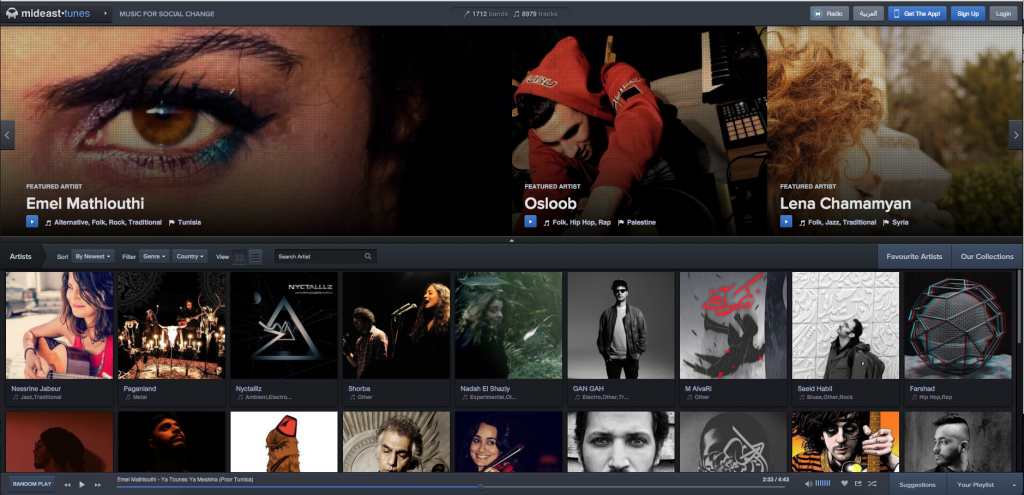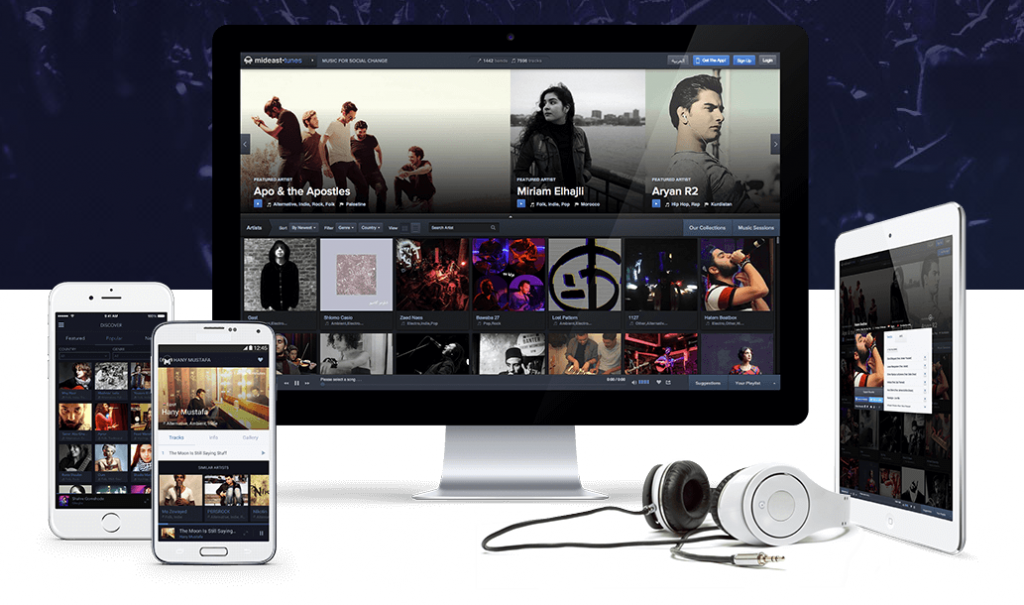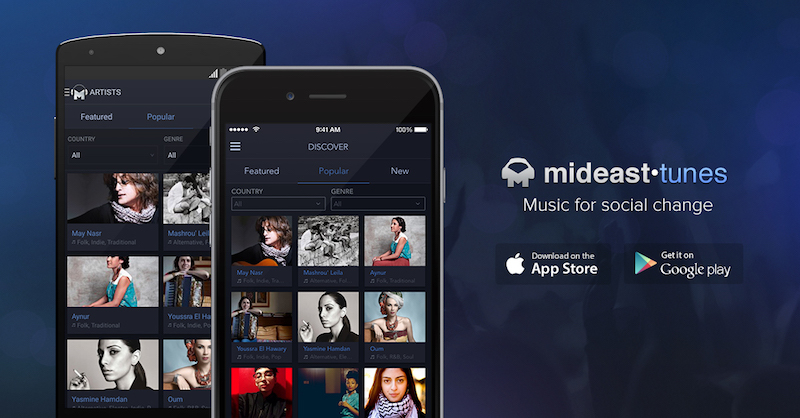Here Mideast Tunes founder and civil rights activist Esra’a Al-Shafei discusses her new music streaming platform and its goal of promoting social change as well as the work of underground artists from the Middle East and North Africa.
_____________________________
Guest Post by Jeremy Young on Soundfly’s Flypaper
“We want our humanity and our futures in our own hands and we use the internet and other forms of technology to fight for those rights.” — Esra’a Al-Shafei
Mideast Tunes is a music streaming platform promoting social change and cultural dialogue by promoting the work of underground artists from the Middle East and North Africa. This website unites musicians and listeners across the boundaries of faith, ethnicity, and location, and since 2010, has become a primary destination for discovering thousands of up-and-coming artists from the region.
Founder Esra’a Al-Shafei is a Bahraini civil rights activist and a defender of free speech. Through her Mideast Tunes and its parent organization Majal, as well as her blog, she works to promote diversity, justice, and inclusion . Her 2011 TEDx interview, which does not show her face, is a powerful meditation on censorship in the Middle East and the ways in which the internet can uphold speech rights globally. Among other accolades, she is a recipient of the Berkman Award from Harvard University’s Berkman Center for Internet and Society for “outstanding contributions to the internet and its impact on society,” and is currently a Shuttleworth Foundation Fellow. In 2011, Esra’a was featured in Fast Company as one of the “100 Most Creative People in Business” and awarded the Monaco Media Prize, which acknowledges innovative uses of media for the betterment of humanity. In 2015 Esra’a received the “Most Courageous Media” award from Free Press Unlimited.
She took a minute recently to tell us about how a music streaming app has the power to change the way we interact with each other as a global community…
Were there any early endorsers to Mideast Tunes who helped spread the word?
Yes, we got early endorsements from bands such as Smouldering in Forgotten, Bahram,Ghogha, Fouad Manshadi, and Checkpoint 303, amongst others, who helped us spread the word about the platform, and we credit such artists for our early success.
Can you briefly explain Mideast Tunes’ mission?
Mideast Tunes’ mission is to unite people across social, political, and religious barriers by creating constructive discourse through music. Through this platform, we wish to reinforced the value of music as more than just a creative outlet, but as a social tool that amplifies the voices of marginalized communities, especially youth, in a way that transforms the entire narrative around the Middle East and North Africa.
How does the signup process work for bands?
Artists have their own sign up button on the site. They simply complete their profiles and add their bios, photos, videos, tracks, and any other information (such as iTunes presence) and we verify the band in the backend to ensure that it’s legit. That process typically takes a day or two before their music goes live. Afterwards, bands are able to login to make the necessary updates (adding/removing tracks and so on).
Finding out about your platform led me to begin thinking what the music streaming industry is like in the Middle East currently… Is there competition form Western streaming services like Spotify and Apple Music in the market?
We don’t really think of competition because our vision is completely different than subscription-based streaming services. We’re here to make meaningful, powerful, and often underrated music available in ways it otherwise wouldn’t be, and we’re a nonprofit. Currently, there’s no other organization in the region doing this at our scale.
Streaming services are slowly gaining popularity in the Middle East, especially niche-based applications. The adoption rate is much slower than it is in the West, but it is steadily gaining traction and widespread users amongst local music fans.
How would you define the term “underground music” as it pertains to the music industry in the Middle East?
“Underground music” in the Middle East has the same definition as it does abroad: It’s primarily non-commercial and goes beyond what is generally accepted in mainstream media. One addition would be that a lot of this music is also censored in parts of the region. Either entire genres are frowned upon, such as heavy metal in places like Saudi Arabia and Yemen; and lyrics that are anti-regime, in places like Syria, Morocco, and Egypt, can even land artists behind bars. Many artists across the MENA region face the same censorship as journalists do.

How do you work directly with artists to promote their work internationally?
We connect them with international press — our artists are often featured anywhere from magazines in Spain to BBC Radio. And a number of filmmakers have gotten in touch with us directly to request introductions to artists whose music they wanted to feature in their films. So the platform has become a haven of discovery for indie music from the region.
Have there been any great success stories?
Yes, one of the first artists to register to Mideast Tunes was from Iran (Foad Manshadi) who ended up being featured on NPR, Fast Company, and other publications as a result of being on the platform. Upon this discovery, he ended up getting other opportunities like being featured on the soundtrack of the FX drama “Sons of Anarchy.” We have also seen a lot of artists being discovered on the platform by major musicians, like Peter Gabriel, who connect the artists with international festivals.
Alternatively, have there been any unfortunate hurdles or setbacks, due to featuring both religious and secular styles of music on the same site?
Not really. The only issue we’ve had is that some Turkish artists did not want to share the platform with Kurdish musicians, and who felt threatened by the fact that we list “Kurdistan” as its own country on the site.
In the same vein, did your business face any challenges in its route to growth?
As a nonprofit still searching for the best way to sustain our growth, our biggest challenge is of course finding the financial means to continue expanding. But the demand for the platform both amongst artists and listeners continues to increase.
How have you worked to grow the business? Did you have to raise investment up front?
We iterate the platform on a monthly basis and work incredibly hard to meet the needs of our users and artists. It’s not an easy or cheap task, and the project remains largely self-funded. It’s worth noting that we also don’t have any full-time staff due to lack of resources, so much of what you see is a labor of love from our amazing volunteers.
We started out with no personal artistic networks. We still barely have any. We work directly with our fans and our artists to keep growing — and that’s why we’ve been growing so fast.

How much of your team are musicians themselves?
We work remotely, and as mentioned previously, we’ve no full-time staff, but rather volunteers. Many of the volunteers are musicians themselves, but most of them are fans who truly believe in our vision and the crucial role music plays in our societies.
What would be your best advice for aspiring musicians these days?
Don’t ask for permission, and don’t wait for validation. If there’s an idea in your head, and you could demonstrate that there is a real need for it in your society, commit to it regardless of lack of resources or outside support. It’s amazing what persistence can achieve after years of nonstop work and dedication.
If you’re interested in hearing more about pioneering new music initiatives, check out the full Entrepreneurship in Music series!
